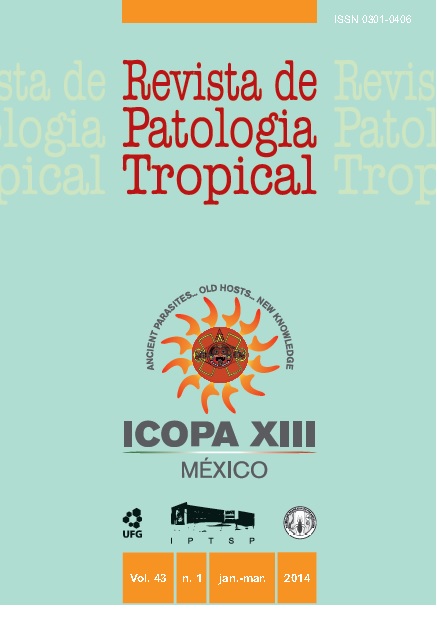CANINE VISCERAL LEISHMANIASIS AND HUMAN VISCERAL AT CARUARU, BRAZIL, IN THE PERIOD 2005 TO 2010
DOI:
https://doi.org/10.5216/rpt.v43i1.29372Keywords:
Dogs, epidemiology, humans, zoonosisAbstract
Visceral Leishmaniasis (VL) is a neglected zoonosis of great importance in public health. The municipal area of Caruaru, as well as other local areas of Brazil presented increasing prevalence rates of this illness. This current assignment was created with the purpose of analyzing and reporting the high rates observed in dogs exhibiting seroconversion for Canine Visceral Leishmaniasis (CVL) and the occurrence of Visceral Leishmaniasis cases in humans within the entire municipal area of Caruaru (rural and urban), as well as the evaluation of practices and strategies in the VL control program during the period between January 2005 and December 2010. An increase in the number of seropositive dogs was verified in a retrospective descriptive study of CVL, from 1.4% (24/1,671) in 2005 to 31.9% (347/1,174) in 2010. With reference to the euthanasia program executed on the seropositive animals in the municipal area, only 44.3% (557/1,258) were eliminated during that period, revealing such a program as ineffective in preventing dissemination of this disease. A second descriptive study was also performed on human cases of VL, notified by the Sistema de Informaçãode Agravos e Notificação (SINAN), revealing that out of the 29 notifications in the studied period, 15 (51.7%) of them originated in the rural area and 14 (48.3%) originated in urban areas. Therefore, it may be observed that the zoonosis has demonstrated growth that is not limited to rural areas, and that the process of urbanization has brought changes in regards to the epidemiological behavior of
the disease including the city of Caruaru-PE.
Downloads
Downloads
Published
How to Cite
Issue
Section
License
The manuscript submission must be accompanied by a letter signed by all authors stating the full name and email address, confirming that the material has not been published or is under consideration for publication elsewhere, and agreeing to transfer copyright in all media and formats for Journal of Tropical Pathology. The authors will not be paid for published articles. They are solely responsible for the content of those articles, even if the Editor holds the right to adjust them to the norms of the journal.
The reviewers will not be paid for the peer review process.

